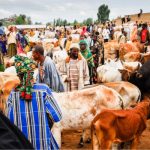The hope that food production will increase in 2024, giving impetus to the goal of targeting zero hunger in the near future, appears to be coming to reality by the day. This is because the decision by the federal government to undertake massive production of food items is being keyed into by the state governments, notwithstanding political orientation. Among states that are involved in the efforts to improve production of food in Nigeria are Oyo, Jigawa, Ekiti, Kebbi and Niger. The federal government flagged off the dry season farming programme last year to ensure that food items like rice, wheat, millet, sorghum, maize, cassava, and yam are produced all year round, and not limited to wet season alone. The intervention in wheat production is not also limited to encouragement of irrigable farming, it also involves the provision of hybrid seedlings that will bring in high yields, which will also be acceptable for the production of agro-allied products within and outside the country. Besides, a massive production of wheat will also help Nigeria to reduce the volume of import of wheat, which accounts for the highest in the food sector. It is expected to reduce the cost of production of products like bread, which is one of the staple foods in the country. That is why the federal government is happy about the collaboration it enjoys from states like Kebbi, which is committed to a massive production of food to battle food insecurity. To this end, the Minister of Agriculture and Food Security, Sen. Abubakar Kyari expressed the appreciation of the Bola Tinubu administration to states that are collaborating in the fight to reduce food inflation in the country. He did this during a recent courtesy visit to his office in Abuja by Governor Mohammed Idris of Kebbi..According to Kyari, it was re-assuring that the Kebbi government took necessary critical steps to enable the cultivation of wheat under the National Agricultural Growth Scheme Agro-Pocket (NAGS-AP) project. There is a reason why Kyari is moved by the commitment of Governor Idris whose state was among the states chosen for the Dry Season Farming across irrigable farmlands. The minister said, “In spite of some of the initial glitches, it is reassuring that your government took necessary critical steps, such as land preparation, and facilitation of tubular irrigation, to enable the cultivation of wheat under the NAGS-AP project.” It takes more than mere tagging along for a sub-national government to enroll into a programme of national importance, particularly where some other tiers would rather see a competition and a conflict of interests. Now, aside from overcoming initial challenges, the state government went further to give the necessary support to farmers without waiting for a handout from the central government. Kyari again,” We are also aware that your government has supported farmers with additional fertilisers and other inputs and provided funds for commodity associations towards boosting agricultural productivity in the state.” The minister, while stating the appreciation of the federal government in this direction, emphasised the need for cooperation among all tiers of government, to achieve the goal of food for all. He said,” There is no doubt that the collective steps we are taking to boost food production, reduce food inflation, and more assuredly guarantee our national food security, are matters of urgent engagement that require increased inter-governmental interactions.”He said that in November, 2023,the ministry commenced the Wheat Dry Season Farming across 15 states that are in the wheat-producing belt of the country. Kyari recalled,” As a reminder, the flag-off was intended to ensure that we rely less on rain-fed agricultural production during the Wet Season, and instead have all-year round farming.” The plan of the federal government, according to the minister, is not just to increase food production, but also provide jobs for the teeming unemployed and, therefore, reduce poverty. Hear him:” In addition to boosting the volumes of crops cultivated, taking advantage of both Dry and Wet Season Farming will increase job opportunities. It will reduce poverty, de-escalate food inflation, and enhance inclusivity, which are goals highlighted in President Bola Tinubu’s Renewed Hope Agenda.” Kyari assured that with adequate readiness, Kebbi should benefit from the second phase of the Dry/Wet Season farming that is due to commence in a couple of weeks.Earlier, Idris said that Kebbi is an agrarian state blessed with fertile land where Millet, Wheat, Rice and Guinea Corn are cultivated. He said that based on the importance the state government attached to farming, it purchased fertilisers worth N2.8 billion to distribute to Kebbi farmers free of charge.The governor said that this was a clear testimony that Kebbi farmers are ready to farm.” For the priority of food security, my administration has purchased 320 trucks of assorted grains and we distributed them to our people free of charge. We are doing these things because we want to encourage them to go back to the farm.” That is why his priority, as he said, is to nurture a quantum leap in agriculture. The governor said,” My first priority is agriculture, the second is education, the third one is security so that farmers will go back to their farms and also secure the State.”Idris disclosed that the state has purchased 6,000 solar pumps for irrigation because of the issue of pump-price increase of Petroleum Motor Spirit, PMS. The pumps will be distributed to farmers. He said that the cluster model would be used so farmers could get the pumps and go back to their farms.His message to the federal government, through the minister, is to state the intention of the state government to work with the government at the centre in enabling food security in Nigeria. He told Kyari,” We want to partner with the Federal Government through the Federal Ministry of Agriculture and Food Security. We will make sure we provide the enabling environment for our farmers because we are out to provide food for the State and Nigeria.” Declarations like this, backed with the actions stated earlier, give hope that the efforts at achieving massive production of food in Nigeria is not a hollow boast intended to deceive the people.












